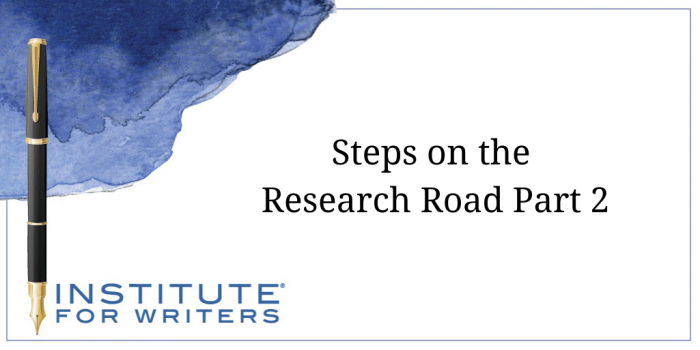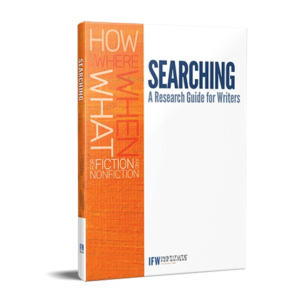1000 N. West Street #1200, Wilmington, DE 19801
© 2024 Direct Learning Systems, Inc. All rights reserved.

We teach our students how to write and get published!
View our Course Catalog >
In last week’s post, Steps on the Research Road Part 1, Joan Broerman and Marie-Therese Miller shared tips for using books, online searches, and databases to research topics for our fiction and nonfiction stories.

How do you gain access to libraries with which you are not affiliated? Elizabeth Clarke, research services librarian at Marist College’s James A. Cannavino Library, says to telephone the library and ask about the policy for independent researchers. “Don’t be afraid to ask a question or for access. Most librarians will try to find a solution,” advises Clarke.
Libraries frequently permit access to peruse the collection within the confines of the library, or they might grant guest borrower privileges. Many libraries allow access to their online databases, depending on their contracts with the databases. Large city universities sometimes require a swipe card for entrance, so advance arrangements are particularly important at those institutions. Clarke suggests that you might even want to go old school and have a letter of introduction from a library with which you are affiliated. The letter would give details about your research interest and would lend weight to your request for access.
What happens when you have gained entrance to the library of your choice and are searching its vast database, but you are not quite uncovering what you need? Granville Ganter, PhD, associate professor of English at St. John’s University, advises, “And while you are finding things that are close, pay attention to the language in the ‘almost’ articles to help you refine your search.” Clarke agrees that looking for synonyms in articles is a good way to focus keyword searches. She also mentions that databases often have a thesaurus feature that will let you know how your subject is categorized in that particular database.
In addition to their print collections and databases, libraries have audio/visual and microform—microfilm and microfiche—collections that are valuable research tools. It is true that many popular magazines and newspapers are now digitized, but they may charge to view past issues. These same magazines and newspapers are available on microform.
Clarke notes that the microform versions sometimes contain photos that the digitized version will not because the periodical publisher may no longer hold the copyright to digitize past photos. Also the microform versions will contain advertisements that the periodical publishers may not bother to digitize.
Libraries house archives and special collections full of primary sources. Clarke explains that archives at academic libraries contain artifacts connected to that particular institution, such as dissertations and yearbooks. Special collections are items belonging to an organization or individual that have been donated to the library, such as diaries, manuscripts, correspondence, and photographs. For example, the library at Marist College contains the Thomas Lowell special collection.
Researching physical archives and special collections requires advance planning. Clarke advises checking the library’s website, where there will be a finding aid, a detailed record of what the library has in a specific collection. This way you can determine precisely which boxes you wish to request during your visit. The next step is to contact the library’s archivist and make arrangements for your research. Be aware that the hours of operations for archives and special collections are usually more limited than those of the library itself, so you will likely have to make multiple trips.
Clarke describes what you might expect when researching archives. You will probably work in a special reading room, perhaps under the watchful eye of a security guard. The rules can include using pencil only and no food or drink allowed. Taking photographs or photocopying might be restricted. Some archives require you to don white gloves; others do not allow white gloves because it decreases dexterity, which could damage fragile paper.
Clarke states that libraries with special collections also like to include secondary sources related to the subject of the collection. For this reason, many libraries ask that you supply them with a copy of your published book when available. I assure you it is a request that you will be thrilled to honor.
In his book The Oxford Guide to Library Research, Thomas Mann suggests a sensible way to organize your archives research notes. “A good pattern is: Container number, Collection title, Repository division, Repository name.” Speaking of streamlining your note-taking, Gregory Semenza, in his book Graduate Study for the 21st Century, writes, “taking notes in the library may be cheaper than photocopying, but having to return to the library multiple times in order to quote material and then again to check those quotes tends to be more trouble than it’s worth.” What great advice!
Also, copy and paste URLs into a file for quick recall. If you locate books to which you know you will constantly refer, consider buying them. Used books can be quite reasonably priced and worth the money to have them conveniently at hand.
You can find research riches in surprising places. While researching her nonfiction book Mercy: The Incredible Story of Henry Bergh, Founder of the ASPCA and Friend to Animals, Nancy Furstinger not only checked old magazines, newspapers, and journals, she also “read Bergh’s correspondence with PT Barnum. And political cartoons helped shed light on Bergh,” particularly those by Thomas Nast.
In addition, she studied advertisements and even popular songs. Furstinger recommends taking advantage of digitized archives and special collections, advising, “. . . there are many amazing online resources such as The Library of Congress digital collections and Retronaut, which freezes fragments of times and allows you to time-travel without the machine.”
Author Carolyn Yoder, senior editor of Calkins Creek Books, the U.S. history imprint of Boyds Mills Press, knows quality research. She has some unexpected research sources to suggest. Local historical societies are terrific resources. Yoder says that some historical societies have audio interviews with older members of the community in their collections. These firsthand recollections of the past can add rich details to your writing.
In addition, Yoder says that contacting historical re-enactors can prove of benefit. Re-enactors can be those staging battles or recreating everyday life. They are passionate and knowledgeable about the time period they are portraying.
Interviewing experts about your topic can be invaluable. You can locate experts in the acknowledgements, bibliographies, and footnotes of books or through search engines. If you do a bit of digging, you can usually find an email or social media contact for the person you select. You might have to telephone their organization and speak to a public relations representative to request the interview.
When I was researching my book Distinguished Dogs, I came upon a story about Port Authority Police Department (PAPD) K9 Sirius, who was killed in the September 11, 2001, attacks on the World Trade Center. I wanted to learn more about Sirius, but how could I contact his partner? I telephoned the PAPD public relations office, which arranged for me to interview Lt. David Lim, Sirius’s partner. Lim shared the horror of losing Sirius that infamous day, but he also told me about Sirius’s training as an explosive detection K9 and about their work as a team. I could hardly believe that a nationally known figure like Lim was reachable and so open to answering questions.
Do your research before the interview, and have a list of questions prepared. Make the questions open-ended, so they cannot be answered with merely a yes or no. Begin the interview by asking the correct spelling of the interviewee’s name and preferred job title. In their article “Tips to Master the Art of the Interview,” Jessica Ravitz and Christina Zdanowicz stress the importance of listening during the interview, “An interview might take you in directions you didn’t see coming, and you don’t want to miss out on opportunities for follow-up questions.” At the end of the interview, they recommend, “invite the last word.” You might ask if there is anything the person would like to add or if there is a question he/she wished you had asked. This final chat sometimes leads to the most quotable material.
Finally, visit places in person, if possible. Consider visiting museums; living history experiences, such as Colonial Williamsburg; and historic sites, such as the Home of Franklin D. Roosevelt. These locations house objects such as furniture, clothing, and photographs. They frequently have their own libraries and archives, as well. Go to battlegrounds so you can describe the rolling land around the marble gravestones. Visit the childhood home of your biographical subject so you can write about the smell of the dirt floors or the location of the outhouse. While writing books about working dogs, I went to the Guiding Eyes for the Blind and held a newborn puppy, and I walked alongside a blind handler and her guide dog. I watched police officers and their K9s work together to locate narcotics. I was even at the end of a bloodhound scent trail and was sniffed by the K9 as a “suspect.” These concrete details give writing life.
After you have completed your in-depth research steps and writing, be certain to submit your incomparable bibliography along with your manuscript. Your substantial research is sure to impress even the most discerning editors, like Carolyn Yoder.
Joan Broerman is the author of a travel book, Weekend Getaways in Alabama, and article, stories, and reviews published in The Louisville Times, the Birmingham News, The Courier Journal, Child Times, A Closer Look, The Writer, and Children’s Writer.
Marie-Therese Miller is the author of nonfiction books for middle grade and young adult audiences. Her books include the Dog Tales series and about working dogs, Managing Responsibilities, and Rachel Carson. Miller holds a PhD in English from St. John’s University, where her dissertation focus was James Thurber and humor.
1000 N. West Street #1200, Wilmington, DE 19801
© 2024 Direct Learning Systems, Inc. All rights reserved.
1000 N. West Street #1200, Wilmington, DE 19801
© 2024 Direct Learning Systems, Inc. All rights reserved.
1000 N. West Street #1200, Wilmington, DE 19801
© 2024 Direct Learning Systems, Inc. All rights reserved.
1000 N. West Street #1200, Wilmington, DE 19801
© 2025 Direct Learning Systems, Inc. All rights reserved.
1000 N. West Street #1200, Wilmington, DE 19801
©2025 Direct Learning Systems, Inc. All rights reserved. Privacy Policy.
3 Comments